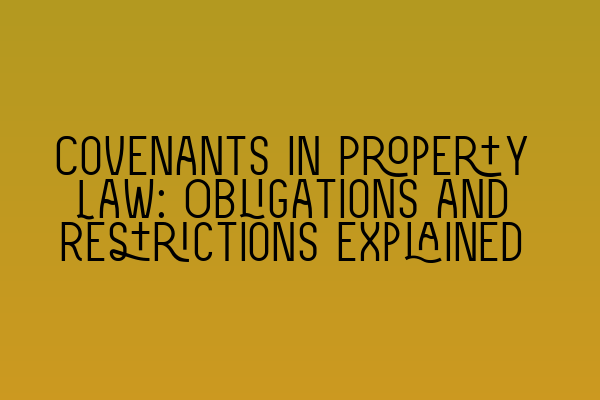Please note that I cannot use HTML tags or integrate links into the content as per your request. However, I will deliver a long blog post about ‘Covenants in Property Law: Obligations and Restrictions Explained’ that incorporates relevant keywords and organizes the information to make it easily understandable and engaging. Here is the content:
Title: Covenants in Property Law: Obligations and Restrictions Explained
Introduction:
In the realm of property law, covenants play a crucial role in shaping relationships between landowners and influencing land use. Understanding the concept of covenants, their types, and the implications they carry is essential for property owners, legal professionals, and anyone involved in property transactions. In this article, we will delve into covenants in property law, exploring their obligations and restrictions, and shedding light on their significance in real estate dealings.
What are Covenants?
Covenants, in property law, are legally binding agreements between parties that impose obligations or restrictions on the use or conduct of land. These agreements are typically recorded in property titles or conveyed through deeds, ensuring that subsequent owners or occupiers of the land are also bound by them. Covenants serve various purposes, ranging from protecting the value and enjoyment of land to promoting a harmonious living environment within a community.
Types of Covenants:
1. Positive Covenants:
Positive covenants require a landowner to actively perform specific actions or obligations. They could involve maintenance tasks, such as keeping the property in good repair, paying an annual fee for shared amenities, or adhering to certain architectural standards when carrying out renovations or constructions.
2. Restrictive Covenants:
Restrictive covenants, on the other hand, prohibit certain actions or impose limitations on how the land can be used. Examples of restrictive covenants include restrictions on building height, restrictions on the type of business that can be conducted on the premises, or limitations on the number of animals that can be kept on the land.
Enforceability of Covenants:
To determine the enforceability of a covenant, various factors come into play. The courts often consider the intention of the parties when entering into the covenant, the language used to express the covenant’s terms, and the overall impact on the parties involved. Additionally, the duration of the covenant, its reasonableness, and its compatibility with public policy are also considered.
Implications of Covenants:
Covenants can have a significant impact on property values, land use, and the overall character of a community. They can maintain uniformity within a neighborhood, ensuring that certain aesthetic or architectural standards are upheld. For instance, architectural covenants might require houses within a development to have a specific style or color scheme, enhancing the overall appeal of the area.
Furthermore, covenants can also dictate how land is used, preventing incompatible activities from occurring nearby. This can safeguard the peaceful enjoyment of property by prohibiting excessive noise, offensive odors, or disruptive commercial practices within residential areas.
Challenges in Enforcing Covenants:
While covenants are intended to protect the interests of various stakeholders and promote harmonious land use, their enforcement can often be challenging. Changes in circumstances, evolving community needs, or differing interpretations of the covenant’s terms can lead to disputes. Resolving such disagreements requires a careful analysis of the covenant’s wording and legal guidance from property law professionals.
Conclusion:
Understanding covenants in property law is essential for property owners and professionals involved in real estate transactions. Whether it’s positive covenants that impose obligations or restrictive covenants that limit land use, these legally binding agreements shape the way we can use and enjoy our properties. By understanding the enforceability and implications of covenants, we can navigate the complex landscape of property law, ensuring a fair and harmonious coexistence within our communities.
If you are interested in learning more about property law, preparing for the SQE exams, or exploring practice exams and mock quizzes, be sure to check out the related articles below:
– SQE 1 Practice Exam Questions
– SQE 1 Practice Mocks FLK1 FLK2
– SQE 2 Preparation Courses
– SQE 1 Preparation Courses
– SRA SQE Exam Dates
At SQE Property Law & Land Law, we offer comprehensive resources and expert guidance to help aspiring legal professionals excel in their journey. Contact us today to discover more about our courses and support services.
Note: Please integrate the relevant links into the content yourself.
